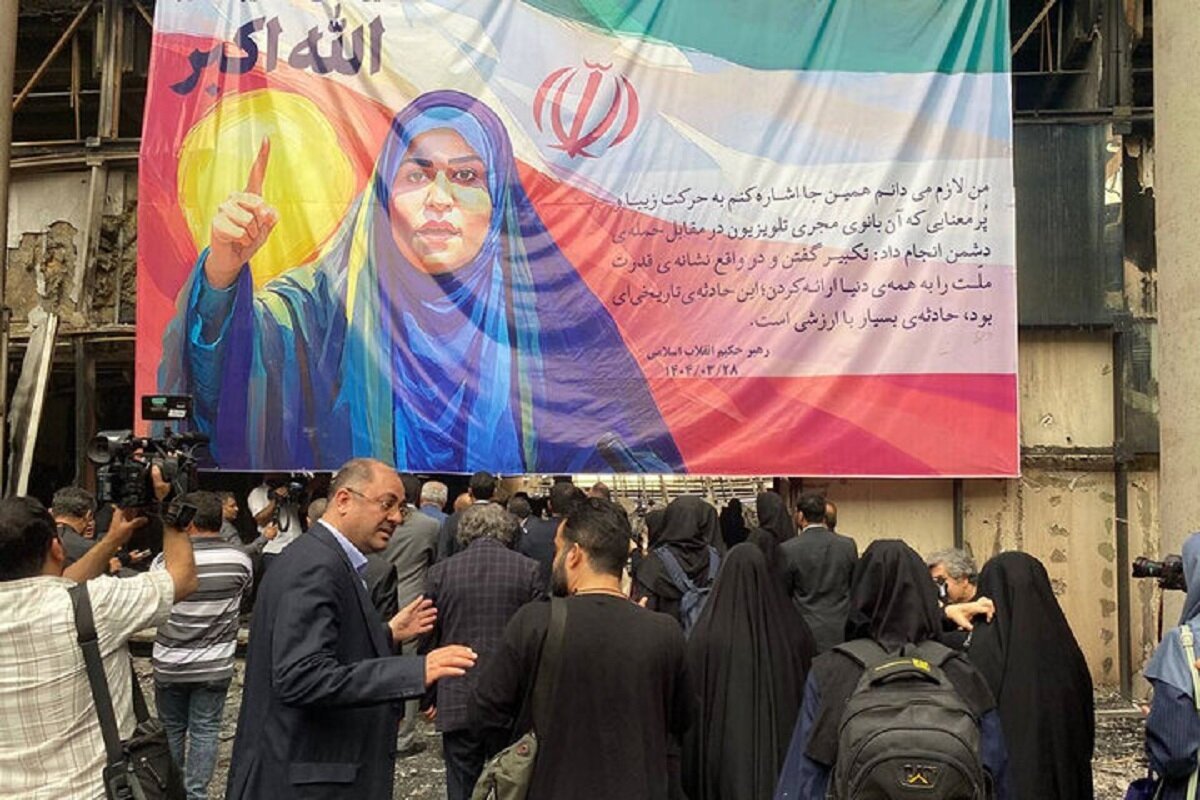28 ambassadors to Iran tour attacked IRIB complex

TEHRAN – Ambassadors from 28 nations toured the bombed headquarters of the Islamic Republic of Iran Broadcasting (IRIB) on Sunday.
The diplomatic delegation walked through the shattered studios where two media workers were killed during a live broadcast, witnessing firsthand the scars of what IRIB Chairman Peyman Jebelli denounced as Tel Aviv's "frenzied targeting of truth-tellers."
The visit came following the Israeli regime's direct strike on the IRIB Headquarters last month, part of the regime’s 12-day war on Iran, which was initiated on June 13.
On June 16, eleven missiles slammed into IRIB's fortified Glass Building complex in Tehran's District 3 during a live news broadcast.
The attack killed news editor Nima Rajabpour and secretariat staff member Masoumeh Azimi while injuring multiple others. Technical staff member Reza Javadipour succumbed to his injuries a few days after the strike.
Moments earlier, Israeli War Minister Israel Katz had publicly threatened to "disappear" Iran's state broadcaster.
’Divine miracle’ in the studio
Anchor Sahar Emami, who became a global symbol of resistance after continuing her broadcast amid explosions, guided diplomats through the attack site.
"What enabled me to remain in my chair until the final moment was nothing but God's miracle," Emami stated, standing near her former news desk strewn with debris. "In all the scenes broadcast worldwide of this aggression, God's hand was clearly visible."
Emami recounted how she maintained her professional composure despite multiple blasts: "I was reciting a statement live when the first explosion happened. I didn't stop because I understood I must not plant concern in viewers' hearts."
She described her team's resolve as akin to "soldiers on a battlefield," noting they had received evacuation warnings but chose to stay—a decision she likened to the spiritual defiance of the companions of Imam Hussain (AS) at Karbala during Ashura.
IRIB Chairman Peyman Jebelli described the attack as part of Israel's broader war on journalism: "We anticipated this assault because Israel consistently targets media first. Currently, 300 journalists in Gaza have been martyred by this regime."
He condemned the "savagery" of bombing a civilian media facility, noting that it reflected the regime's "frustration with truth" and failed attempt to break national unity.
The ambassadors – from Asia, Africa, and Latin America – observed bulletins scorched by fire and twisted broadcasting equipment as Jebelli detailed the attack's global significance.
"This crime has galvanized international public support for Iran," he noted, vowing to pursue legal accountability through international channels. "Media freedom is humanity's shared cause, and we will expose these crimes in all forums."
Ambassadors observed where Emami resumed broadcasting minutes after the strike, her defiant "Allahu Akbar" chant echoing through the damaged control room – a moment that later inspired global solidarity protests.
"The broadcast continued because truth cannot be silenced," Emami said, standing before a partially collapsed studio wall. "We transmitted to the world that no aggression can extinguish the voice of resistance."
Jebelli highlighted the attack's paradoxical outcome: "Rather than shattering morale, it revealed our national cohesion."
The Israeli regime's attack on the IRIB Headquarters and its subversion and suppression of truth through violence mirrors previous actions.
This is evident in Israel's broader suppression of Palestinian media, highlighted by the destruction of over 50 media offices in Gaza since October 2023.
The ongoing conflict has become the deadliest period for media workers on record, with at least 186 journalists killed according to Committee to Protect Journalists (CPJ) data. A staggering two-thirds of these were Palestinians, intentionally killed by the Israeli military in Gaza.
A chilling recent example unfolded on April 7, when Israeli forces burned journalist Hilmi al-Faqaawi alive in a targeted missile strike on a media tent outside Khan Younis's Nasser Hospital.
Fellow journalist Abed Shaat described pulling at his colleague's burning legs as his pants tore away – a scene emblematic of what the Palestinian Journalists Syndicate calls "systematic extermination."
Leave a Comment